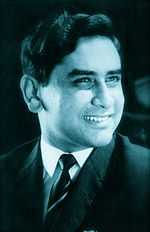Arshad Sami Khan
| Arshad Sami Khan | |
|---|---|
|
Ambassador Arshad Sami Khan | |
| Birth name | Arshad Sami Khan |
| Born | 8 January 1942 |
| Died | 22 June 2009 (aged 67) |
| Service/branch |
Pakistan Air Force Ministry of Foreign Affairs Ministry of Culture Commissioner General of Pakistan |
| Awards |
Sitara-e-Jurat Sitara-i-Imtiaz (posthumous; 2012) Military Medal of Honour from King Hussain of Jordan Military Medal of Honour from the Shah of Iran Military Medal of Honour from Turkey Special Medal for Services to Humanity from the United Nations |
| Spouse(s) | Naureen Sami Khan |
| Other work | Diplomat, Bureaucrat, author |
Arshad Sami Khan (Urdu ارشد سمیع خان); (January 8th, 1942 – June 22nd, 2009) was an accomplished & distinguished Bureaucrat. He started his career as a Pakistan Air Force fighter pilot and later a diplomatic Ambassador and Commissioner General of Pakistan. He was also the father of the famous Singer and Music Composer Adnan Sami.[1][2][3]
Personal life
Born in January 1942, Arshad Sami Khan was a distinguished member of the Aristocracy. He was originally from Herat, Afghanistan. His Grand Fathers were among the 'Key' Cabinet Members of Afghanistan's King Amanullah Khan. Their names were General Ahmed Jan – Military Advisor to the King of Afghanistan – Amanullah Khan & General Agha Mehfooz Jan – Governor of Herat, Kandahar, Balkh & Jalalabad in Afghanistan during the Reign of King Amanullah Khan. At the time of the famous Bacha Saqqa revolution in Afghanistan, Khan's Grand Fathers were assassinated. The family therefore migrated to Peshawar which was a part of British India at that time. He was of Pashtun origin.[4] Arshad was married to Naureen Sami Khan. Together they have two sons. Their elder son, Adnan Sami, is a famous Singer and Music Composer based in Mumbai. Their younger son's name is Junaid Sami Khan.
Pakistan Air Force
Khan decided in his early years to follow the military traditions of his forefathers and joined the Pakistan Air Force. He became a National Hero & was awarded the Sitara-i-Jurat, Pakistan's highest military medal of honour for bravery. His name is honoured at the Pakistan Air Force Museum in Karachi.[5] He holds the record for maximum flying hours during war. He was also the youngest recipient of the prestigious "Best Fighter Pilot's Trophy".
Khan also had the distinction of serving three Presidents of Pakistan as their Aide-de-camp (ADC); namely presidents Ayub Khan, Yahya Khan and Zulfiqar Ali Bhutto.
He retired from the Air Force in 1972 & joined the Foreign Service on the behest of President Zulfiqar Ali Bhutto.
Ambassador
Arshad Sami Khan was appointed Pakistan's first Ambassador to Estonia in August 1993 along with serving as Ambassador to three other Scandinavian countries simultaneously; Sweden, Denmark and Norway.[6] He served as Ambassador of Pakistan to ten other countries.
He was Chief of Protocol to presidents Ghulam Ishaq Khan, Wasim Sajjad and Farooq A. Leghari and also served as Chief of Protocol to Prime Ministers Benazir Bhutto, Ghulam Mustafa Jatoi and Nawaz Sharif. Khan went on to become the first Commissioner General of Pakistan (appointed by Benazir Bhutto) and then a Federal Secretary to the Government of Pakistan.[7] On the occasion of Independence Day on 14 August 2012, the President of Pakistan posthumously conferred Khan the Highest Civilian Award of Sitara-i-Imtiaz to honour his services to Pakistan.
Author
Khan wrote a book about his experience as an Aide-de-camp entitled "Three presidents and an Aide" which was released in March 2008 & went onto become a best-seller in the Sub-Continent.[8] The book is a candid eye witness account of historical events, seen from within the 'ring-side' that occurred during the reign of the 3 presidents- Presidents Ayub Khan, Yahya Khan & Zulfiqar Ali Bhutto. No Publisher in Pakistan was willing to publish the book. It was therefore published & released in India, launched by former Indian Prime Minister I.K. Gujral to rave reviews & sales.
Illlness
Khan was diagnosed with Pancreatic Cancer in 1989. Prime Minister Benazir Bhutto had him flown to London where he was operated at Cromwell Hospital. However, within 3 months of the operation thereafter, he resumed working in the Foreign Office continuing his Ambassadorial Assignments around the world, whilst battling cancer for 20 years. He died on 22 June 2009 at 'Kokilaben Dhirubhai Ambani' Hospital in Mumbai. His burial ceremony took place in Islamabad with profound Military Honours including a 21-Gun Salute.
Awards
- Sitara-e-Jurat
- Sitara-i-Imtiaz (posthumous; 2012)
- Best Fighter Pilot's Trophy
- Military Medal of Honour from King Hussain of Jordan
- Military Medal of Honour from the Shah of Iran
- Military Medal of Honour from Turkey
- Special Medal for Services to Humanity from the United Nations
References
- ↑ Squadron Leader Arshad Sami Khan Retrieved 21 April 2011
- ↑ PM visits residence of Arshad Sami to condole his death Retrieved 21 April 2011
- ↑ Musician leaves for Pakistan
- ↑ Adnan Sami: Fastest fingers first
- ↑ PAF Museum
- ↑ Estonia and Pakistan Bilateral Relations Estonian Ministry of Foreign Affairs, Retrieved 21 April 2011
- ↑ Arshad Sami Khan — an ambassador of love and humanity
- ↑ Three Presidents & an Aide
